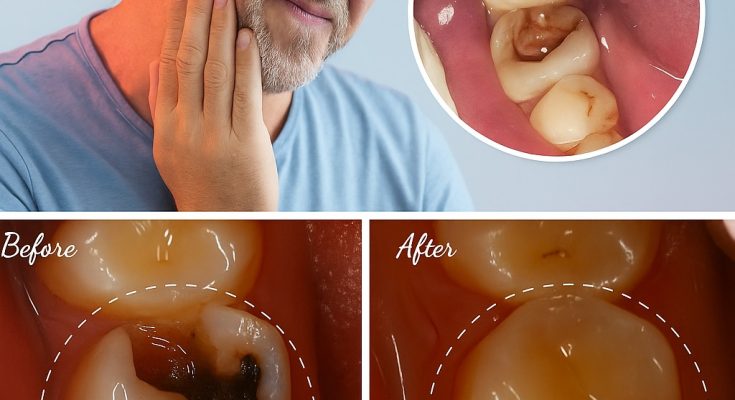Keeping your teeth strong and healthy doesn’t always require expensive treatments or frequent dental appointments. In fact, many powerful solutions for oral care can be found right at home—naturally. With the right habits and a few nature-based remedies, you can support your teeth and gums effectively.
In this guide, we’ll explore essential tips to maintain oral hygiene and five time-tested natural remedies that may help prevent and even reverse early signs of tooth decay. Let’s dive into a cleaner, healthier smile—naturally.
Why Natural Dental Care Is Effective
Your mouth is a delicate ecosystem filled with bacteria—both good and bad. When this balance is disrupted by sugar, processed food, or acidic drinks, harmful bacteria can multiply and cause issues like cavities and gum disease.
Natural remedies help restore this balance. They support the mouth’s natural ability to repair itself by promoting remineralization of the enamel, reducing inflammation, and boosting overall gum health.
Brush with a Natural Toothpaste
Switching to a natural toothpaste is one of the simplest steps you can take for better oral care. Many conventional toothpastes contain ingredients like fluoride, sodium lauryl sulfate (SLS), and artificial flavors that may not be ideal for sensitive gums or those seeking a chemical-free approach.
Instead, choose toothpaste made with ingredients like baking soda, bentonite clay, or neem. These elements gently polish the teeth, remove bacteria, and neutralize acids without harming your enamel or oral microbiome.
Practice Oil Pulling for a Cleaner Mouth
Oil pulling is an ancient Ayurvedic technique that involves swishing oil—typically coconut oil—in the mouth for 10 to 20 minutes. This process helps pull out toxins, reduce bacteria, and even improve gum health.
Many people notice fresher breath and a cleaner mouth after just a few days of oil pulling. It’s best done in the morning before brushing to maximize its cleansing effects. Coconut oil also contains natural antimicrobial properties that support oral healing.
Eat More Raw, Crunchy Vegetables
Crunchy vegetables like carrots, celery, and apples do more than satisfy your hunger—they act as nature’s toothbrushes. As you chew them, they help scrub plaque and stimulate saliva production, which naturally protects your enamel.
Saliva is essential for keeping your mouth in balance. It helps wash away food particles and neutralize acids that wear down your teeth. Adding more raw veggies to your diet is a win for both your body and your smile.
Reduce Sugar and Acidic Beverages
Sugary foods and acidic drinks like soda and juice feed bad bacteria in your mouth. These bacteria produce acid that wears down your enamel, leading to cavities over time.
Swap these beverages with mineral-rich alternatives like herbal teas, coconut water, or green smoothies. If you do consume something acidic, rinse your mouth with water afterward to protect your teeth.
Use a Mineralizing Mouthwash
Homemade or natural mouthwashes can help strengthen enamel and support fresh breath. Look for formulas that include trace minerals, xylitol, or essential oils such as clove, peppermint, or tea tree oil.
These ingredients work by reducing bacterial buildup, freshening breath, and delivering minerals directly to the tooth surface. Use a mineralizing rinse once or twice daily for added protection.
Floss Daily with Natural Options
Flossing removes food particles and plaque from areas that brushing can’t reach. To stay eco-conscious and chemical-free, opt for biodegradable floss coated in natural beeswax or essential oils.
Daily flossing helps prevent cavities between the teeth and protects your gums from inflammation. It’s a small habit that makes a big difference in your long-term dental health.
Stay Hydrated to Support Saliva Production
Drinking enough water throughout the day is essential for maintaining oral health. Saliva plays a major role in protecting your teeth—it helps wash away bacteria, neutralizes acid, and supports healthy digestion starting in the mouth.
Aim to sip water regularly, especially after meals or snacks. If your mouth feels dry often, consider herbal teas or adding a slice of lemon or cucumber to your water for extra flavor.
5 Natural Remedies That May Help Reverse Early Cavities
Cavities caught early—such as white spots or slight sensitivity—can often be managed with at-home care. These five natural remedies may help remineralize teeth and prevent further decay when used consistently and properly.
Clove Oil Paste for Pain and Bacteria
Clove oil is widely known for its pain-relieving and antibacterial properties. It’s commonly used in natural dental treatments because it helps reduce inflammation and kill harmful bacteria.
How to use:
- Mix 2 drops of clove essential oil with 1 teaspoon of coconut oil. Apply this mixture to the affected tooth using a cotton swab. Let it sit for 10–15 minutes, then rinse. Repeat once or twice daily.
This remedy is especially helpful for relieving discomfort while also targeting bacteria that contribute to cavities.
Remineralizing Tooth Powder
You can make your own enamel-supporting tooth powder using safe, natural ingredients. This blend helps neutralize acids, clean the surface of your teeth, and supply minerals needed for remineralization.
Ingredients:
- 2 tablespoons bentonite clay
- 1 tablespoon baking soda
- 1 teaspoon ground cinnamon
- 10 drops peppermint essential oil
📌Thank you for reading the article.
How to use:
Dip a wet toothbrush into the powder and brush for 2 minutes. Use daily for optimal results.
Neem Stick Brushing
Neem is a traditional Indian plant known for its powerful antibacterial properties. Neem sticks are still used today in many parts of the world for brushing teeth.
How to use:
Chew on the end of a neem stick until it softens and frays. Then use the frayed end to brush your teeth. It’s a sustainable, fluoride-free option that naturally reduces plaque and improves gum health.
Eggshell Powder for Calcium
Eggshells are a surprising but excellent source of calcium and phosphorus—two minerals vital for strong enamel. Turning them into powder gives your body a natural supply of these nutrients.
How to make:
Boil and dry organic eggshells, then grind them into a fine powder. Mix with coconut oil and peppermint oil to create a paste. Brush with this paste 2–3 times per week to strengthen enamel.
Turmeric and Salt Gum Rub
Turmeric is known for its anti-inflammatory and antimicrobial properties. When combined with a pinch of salt and mustard oil, it creates a powerful gum-supporting paste.
How to use:
Mix 1 teaspoon turmeric, a pinch of salt, and a few drops of mustard oil. Massage the mixture into your gums and teeth for 1–2 minutes, then rinse thoroughly. This helps reduce gum inflammation and supports cleaner teeth.
When to See a Dentist
Natural remedies can support oral health, but they aren’t a substitute for professional dental care. If you experience sharp pain, gum swelling, or visible holes in your teeth, it’s time to visit a dentist.
Use these remedies for early prevention and minor concerns—but always consult a dental professional for serious symptoms or ongoing issues.
Final Thoughts: Build Better Oral Health Naturally
Natural dental care is about more than just avoiding cavities—it’s about building daily habits that protect your teeth and gums for the long haul. From brushing with safe ingredients to oil pulling and homemade treatments, these tips offer an accessible, effective way to maintain your oral hygiene.
Incorporate a few of these strategies into your routine and you may notice fresher breath, less sensitivity, and fewer trips to the dentist. With consistency and a little nature-inspired support, your smile can stay strong and healthy—naturally.



